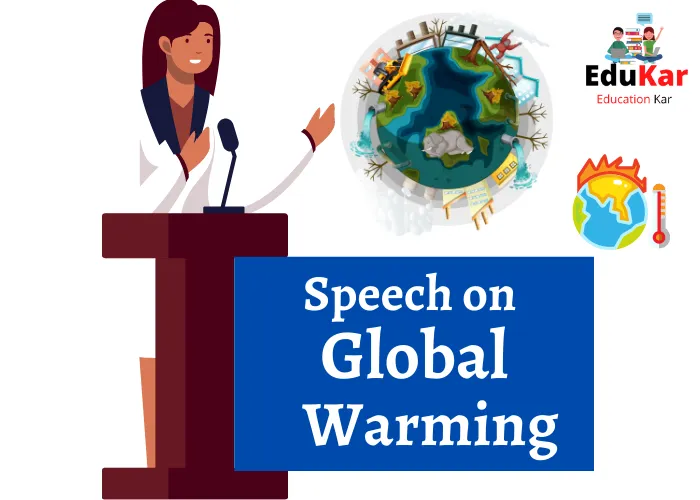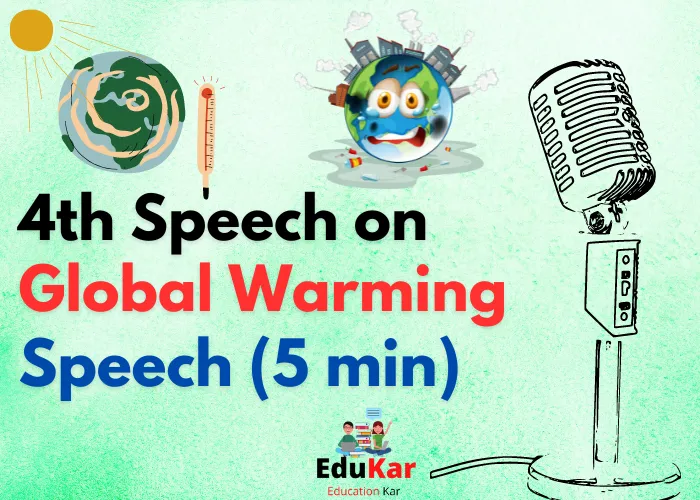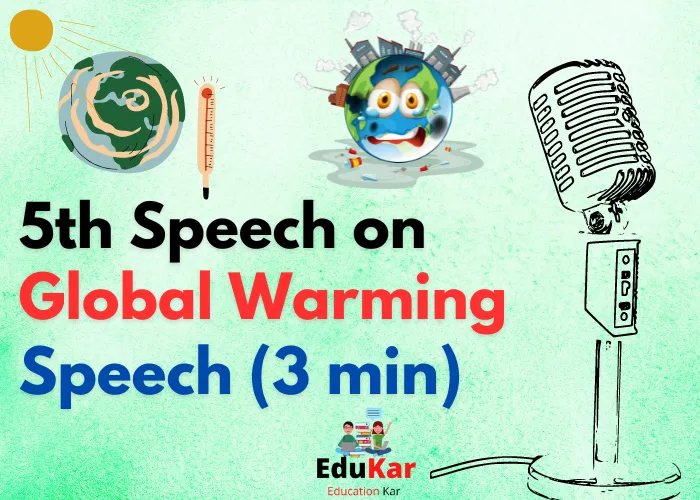These 5 Best speeches on global warming by Edukar discusses the causes, effects, and potential solutions to one of the most pressing issues of our time. Share your thoughts with your audience about the science behind climate change and how we can take action to decrease its impact on our planet.

1st Global Warming Speech (20 min)

Good Morning/Afternoon/Evening Ladies and gentlemen,
Today, I want to talk about a critical issue that is affecting our planet: global warming. The earth’s climate is changing, and we must take action to reduce its impact. The scientific consent is clear; the planet is getting warmer, and human activities are primarily responsible. Our choices today will determine the future of our planet and the generations that will come after us.
Global warming is the gradual increase in the Earth’s average temperature caused by the buildup of greenhouse gases in the atmosphere. These gases trap heat from the sun and prevent it from escaping into space, leading to a warming effect on the planet. Human activities such as burning fossil fuels, deforestation, and industrial processes are the main sources of greenhouse gas emissions.
The effects of global warming are already visible, and they are concerning. We are experiencing more frequent and severe weather events such as hurricanes, droughts, and wildfires. Rising sea levels are threatening the existence of low-lying regions and island nations. These changes are impacting our economy, our health, and our way of life. If we do not act now, the consequences will only become more severe.
We have the technology and the knowledge to reduce the impact of global warming. We need to work together as a global community to reduce greenhouse gas emissions and transition to a low-carbon economy. The solutions are many, and we need to act on them now. Here are some actions that we can take as individuals and communities:
1. Reduce energy consumption: We can reduce our carbon footprint by using energy-efficient appliances, switching to renewable energy sources, and turning off lights and appliances when not in use.
2. Drive less: We can reduce our transportation emissions by using public transportation, biking, or walking whenever possible.
3. Eat less meat: The production of meat generates significant greenhouse gas emissions. Reducing meat consumption can have a positive impact on the environment and our health.
4. Plant trees: Trees absorb carbon dioxide from the atmosphere and help mitigate the impact of global warming.
5. Support clean energy policies: We need to support clean energy policies that reduce greenhouse gas emissions and transition us to a low-carbon economy.
We also need our governments to take action. Governments must set ambitious targets to reduce emissions and invest in clean energy. They can also support research and development of new technologies that reduce emissions.
We need to remember that our choices today will determine the future of our planet. We have the power to make a positive impact on the environment and our communities. We can all take small steps to reduce our carbon footprint and encourage others to do the same. We need to work together to ensure a sustainable future for ourselves and future generations.
In the end, global warming is a critical issue that we must address now. The evidence is clear, and the consequences of inaction are dire. We have the solutions, and we need to act on them now. Let us all take responsibility for our actions and work together to mitigate the impact of global warming.
Thank you.
Also Read: Speech on India
2nd Global Warming Speech (15 min)

Good Morning/Afternoon/Evening Ladies and gentlemen,
Today, I would like to talk to you about a topic that is not only relevant but also critical to our survival as a species: global warming.
We are currently living in a time of uncommon change, where our planet is facing an existential threat like never before. The Earth’s temperature is rising at an alarming rate, and this increase is largely due to human activity, such as the burning of fossil fuels and deforestation.
Global warming is a phenomenon that is the increase in the Earth’s average temperature over time. This increase is caused by the accumulation of greenhouse gases in the atmosphere, which trap heat from the sun and prevent it from escaping back into space. The most significant greenhouse gas is carbon dioxide, which is produced by the burning of fossil fuels like coal, oil, and gas.
The effects of global warming are already being felt around the world, from rising sea levels and more frequent and intense natural disasters like hurricanes, floods, and droughts, to the melting of the polar ice caps and the loss of habitat for countless species of animals.
If we do not take urgent action to reduce our greenhouse gas emissions and slow the pace of global warming, the consequences could be disastrous. We are already seeing the effects of climate change in the form of rising sea levels, more frequent and severe weather events, and the loss of biodiversity.
So what can we do to address this issue? The first step is to reduce our carbon footprint by adopting more sustainable practices in our daily lives. This could include using public transportation, carpooling, and cycling instead of driving, reducing energy consumption by turning off lights and unplugging electronics when not in use, and using energy-efficient appliances and light bulbs.
We can also support renewable energy sources like wind, solar, and hydropower by investing in companies that produce clean energy and advocating for government policies that encourage their use. This could include supporting renewable energy tax credits, renewable portfolio standards, and other incentives that make it easier and more affordable to transition away from fossil fuels.
Another important step is to reduce our reliance on single-use plastics and other disposable products. Plastic waste is a major contributor to environmental pollution and can take hundreds of years to decompose. By choosing reusable products instead, we can help reduce the amount of waste that ends up in our landfills and oceans.
Finally, we can all do our part by supporting organizations that are working to address the issue of global warming. This could include supporting research and development of new technologies that reduce greenhouse gas emissions, supporting conservation efforts to protect natural habitats and ecosystems, and advocating for government policies that prioritize the environment and public health.
In the end, global warming is an issue that affects us all, and it is up to each and every one of us to take action to address this critical issue. By making simple changes in our daily lives and supporting policies and organizations that promote sustainability, we can help reduce our impact on the environment and ensure a brighter future for generations to come.
Thank you.
Also Read: Speech on Clean India
3rd Global Warming Speech (10 min)

Good Morning/Afternoon/Evening Ladies and gentlemen,
Today i am going to talk about a topic that has become increasingly important in recent years – global warming. It is a subject that is on everyone’s mind, and it affects us all, regardless of where we live or what we do.
Global warming is the gradual increase in the Earth’s surface temperature due to the buildup of greenhouse gases in the atmosphere. These gases, including carbon dioxide, methane, and nitrous oxide, trap heat from the sun and prevent it from escaping into space. As a result, the Earth’s temperature has risen by about 1.1 degrees Celsius since the pre-industrial era, and the rate of warming is increasing.
The consequences of global warming are far-reaching and severe. Rising temperatures are causing ice caps and glaciers to melt, leading to a rise in sea levels. This is already causing flooding in low-lying areas and is expected to displace millions of people in the coming decades. The warmer temperatures are also causing more frequent and severe heat waves, droughts, and wildfires, leading to crop failures and food shortages in some areas.
The rise in temperature is also having a devastating impact on wildlife. Many species are already facing extinction due to habitat loss and fragmentation caused by human activities, and the additional stress of climate change is pushing them even closer to the brink.
So what can we do to address this pressing issue? The first step is to acknowledge that global warming is real and that it is caused by human activities, primarily the burning of fossil fuels such as coal, oil, and gas. We must take responsibility for our actions and work together to reduce our carbon footprint.
There are several ways we can do this. The first is to reduce our energy consumption by using more efficient appliances, turning off lights when we leave a room, and adjusting our thermostats to save energy. We can also reduce our reliance on fossil fuels by using public transportation, biking, or walking instead of driving, and investing in renewable energy sources such as solar and wind power.
Another critical step is to support policies that promote sustainability and reduce greenhouse gas emissions. This could include government incentives for businesses to invest in renewable energy, carbon taxes to discourage the use of fossil fuels, and regulations that limit carbon emissions from power plants and factories.
Finally, we must all work together to raise awareness of the importance of addressing global warming. This could involve volunteering with organizations that are working to reduce greenhouse gas emissions, speaking to friends and family members about the issue, and using social media to raise awareness.
At the end, global warming is a significant threat to our planet and our way of life. It is caused by human activities and requires collective action to address. By reducing our carbon footprint, supporting sustainable policies, and raising awareness of the issue, we can work together to mitigate the effects of global warming and ensure a healthy and sustainable future for generations to come.
Thank you.
Also Read: Speech About Nature
4th Global Warming Speech (5 min)

Respected Teachers/Students and Everyone
Today, I would like to talk about one of the most pressing issues facing our planet today: global warming. Global warming, also known as climate change, is the gradual increase in the average temperature of the Earth’s atmosphere and oceans over time. This phenomenon has been caused primarily by the increased emission of greenhouse gases, such as carbon dioxide, methane, and nitrous oxide, into the atmosphere as a result of human activities.
Global warming is a serious problem with far-reaching consequences. The Earth’s climate is changing at an unprecedented rate, and this is having a profound impact on the environment, the economy, and human health. Some of the most significant effects of global warming include rising sea levels, more frequent and severe heatwaves, droughts, and floods, and the loss of biodiversity.
The main cause of global warming is the burning of fossil fuels such as coal, oil, and gas. When these fuels are burned, they release large amounts of carbon dioxide into the atmosphere, which acts as a greenhouse gas and traps heat from the sun, causing the Earth’s temperature to rise. In addition to fossil fuels, deforestation and other land-use changes are also major contributors to global warming.
So, what can we do to address this problem? There are many actions that we can take as individuals and as a society to reduce our greenhouse gas emissions and mitigate the effects of global warming.
Firstly, we need to reduce our reliance on fossil fuels. This can be done by promoting the use of renewable energy sources such as solar, wind, and hydropower. We also need to increase energy efficiency in our homes and businesses, which can be achieved through better insulation, efficient appliances, and more sustainable transportation options.
Secondly, we need to protect our natural environment. This can be done by preserving forests and other ecosystems, which act as carbon sinks and help to absorb carbon dioxide from the atmosphere. We also need to promote sustainable agriculture and reduce food waste, as these can also have a significant impact on greenhouse gas emissions.
Thirdly, we need to work together as a global community to address this problem. Governments, businesses, and individuals all have a role to play in reducing greenhouse gas emissions and adapting to the effects of global warming. We need to cooperate and collaborate to find innovative solutions and implement effective policies that can help to protect our planet for future generations.
In the end, global warming is one of the most significant challenges facing our planet today. It is up to all of us to take action to reduce our greenhouse gas emissions and mitigate the effects of climate change. By working together, we can protect our planet and ensure a sustainable future for generations to come.
Thank you.
Also Read: Speech On Air Pollution
5th Global Warming Speech (3 min)

Respected Teachers/Students and Everyone
Today, I want to talk about a topic that affects every single person on this planet: global warming. For many years, scientists have been warning us about the dangers of global warming, and yet we continue to ignore their warnings. We must act now to reduce the impact of global warming, or we risk catastrophic consequences for future generations.
Global warming is the gradual increase in the Earth’s surface temperature due to human activities such as burning fossil fuels, deforestation, and industrial processes. This increase in temperature leads to a number of serious consequences, such as rising sea levels, more frequent and severe natural disasters, and loss of biodiversity.
The impacts of global warming are already being felt around the world. Glaciers are melting, oceans are becoming more acidic, and extreme weather events such as hurricanes and heatwaves are becoming more common. These changes not only affect the environment, but also have a significant impact on human health, food security, and the economy.
To reduce the impact of global warming, we need to take action on multiple things. We must reduce our greenhouse gas emissions. This means transitioning away from fossil fuels and towards renewable energy sources such as wind and solar power. We must also reduce our energy consumption by adopting energy-efficient technologies and practices.
We must protect and restore natural ecosystems. Forests, wetlands, and other natural habitats are essential for regulating the Earth’s climate and storing carbon. By protecting and restoring these ecosystems, we can help to decrease the impacts of global warming.
Also, we must adapt to the impacts of global warming that are already happening. This means developing strategies to protect vulnerable communities from natural disasters, such as building sea walls and improving disaster response systems. We must also invest in research and development to develop new technologies and solutions to the challenges posed by global warming.
At the end, global warming is a serious threat to our planet and requires immediate action. We must work together to reduce our greenhouse gas emissions, protect and restore natural ecosystems, and adapt to the impacts of global warming. By taking action now, we can ensure a sustainable future for ourselves and future generations.
Thank you.
Also Read: Speech on Climate Change
FAQs related to Global Warming:
What is Global Warming?
Global warming is the gradual increase in the average temperature of the Earth’s atmosphere and oceans, primarily caused by the burning of fossil fuels that release carbon dioxide and other greenhouse gases into the atmosphere.
What are the effects of Global Warming?
The effects of global warming include rising sea levels, melting glaciers and ice caps, more frequent and severe weather events, such as hurricanes and droughts, and changes in the distribution of plant and animal species.
Why is global warming a problem?
Global warming is a problem because it threatens the Earth’s delicate ecological balance and the survival of many species, including humans. It also poses a risk to food security, water availability, and infrastructure.
What can we do to address global warming?
There are many things we can do to address global warming, including reducing greenhouse gas emissions through the use of renewable energy sources, conserving energy, and promoting energy efficiency. We can also support policies and programs that encourage sustainable living, such as public transportation, green buildings, and recycling.
What role do individuals and communities play in addressing global warming?
Individuals and communities play a critical role in addressing global warming. By making small changes in our daily lives, such as reducing our energy consumption, recycling, and choosing more sustainable products, we can contribute to reducing greenhouse gas emissions. Additionally, communities can come together to advocate for policy changes and promote sustainability initiatives.
What is the role of government and businesses in addressing global warming?
Governments and businesses have a crucial role to play in addressing global warming. Governments can implement policies and regulations that reduce greenhouse gas emissions, such as carbon taxes and emissions trading schemes. Businesses can also reduce their carbon footprint through the use of renewable energy and sustainable practices. Additionally, they can invest in and develop innovative technologies that reduce emissions and help transition to a low-carbon economy.
How can we raise awareness about global warming?
Raising awareness about global warming is essential to encourage action and support for solutions. We can use various methods, such as social media campaigns, educational programs, public events, and media coverage to raise awareness and promote the urgent need for action. Additionally, we can engage with policymakers and community leaders to advocate for sustainable policies and initiatives.